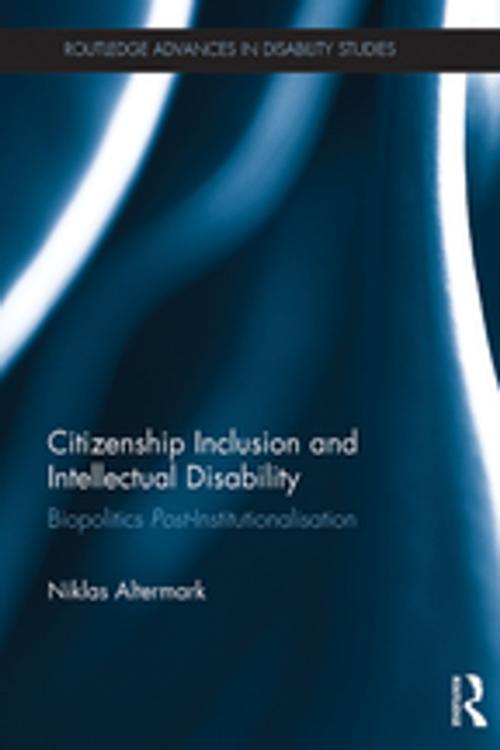Citizenship Inclusion and Intellectual Disability
Biopolitics Post-Institutionalisation
Nonfiction, Social & Cultural Studies, Social Science, Disability, Political Science, Government, Social Policy, Sociology| Author: | Niklas Altermark | ISBN: | 9781351614597 |
| Publisher: | Taylor and Francis | Publication: | November 9, 2017 |
| Imprint: | Routledge | Language: | English |
| Author: | Niklas Altermark |
| ISBN: | 9781351614597 |
| Publisher: | Taylor and Francis |
| Publication: | November 9, 2017 |
| Imprint: | Routledge |
| Language: | English |
What happens when a group traditionally defined as lacking the necessary capacities of citizenship is targeted by government programs that have made ‘citizenship inclusion’ their main goal? Combining theoretical perspectives of political philosophy, social theory, and disability studies, this book untangles the current state of Western intellectual disability politics following the replacement of state institutionalisation by independent and supported living, individual rights, and self-determination.
Taking its cue from Foucault’s conception of ‘biopolitics’, denoting the government of the individuals and the totality of the population, its overarching argument is that the ambiguous positioning of people with intellectual disabilities with respect to the ideals of citizenship results in a regime of government that simultaneously includes and excludes people of this group. On the one hand, its members are projected to become ideal-citizens via the cultivation of citizenship capacities. On the other, the right to live independently and by their own choices is curtailed as soon as they are seen as failing with respect to the ideals of reason and rationality. Therefore, coercion, restraints, and paternalism, which were all supposed to end with deinstitutionalisation, are still ingrained in services targeting the group.
In equal parts a theoretical work, advancing debates of critical disability theory, social theory, and post-structural philosophy, as well as an empirical engagement with the history of intellectual disability politics and the ways in which present day politics target the group, this book will be of interest to all students and scholars of disability studies, disability politics, and political theory.
What happens when a group traditionally defined as lacking the necessary capacities of citizenship is targeted by government programs that have made ‘citizenship inclusion’ their main goal? Combining theoretical perspectives of political philosophy, social theory, and disability studies, this book untangles the current state of Western intellectual disability politics following the replacement of state institutionalisation by independent and supported living, individual rights, and self-determination.
Taking its cue from Foucault’s conception of ‘biopolitics’, denoting the government of the individuals and the totality of the population, its overarching argument is that the ambiguous positioning of people with intellectual disabilities with respect to the ideals of citizenship results in a regime of government that simultaneously includes and excludes people of this group. On the one hand, its members are projected to become ideal-citizens via the cultivation of citizenship capacities. On the other, the right to live independently and by their own choices is curtailed as soon as they are seen as failing with respect to the ideals of reason and rationality. Therefore, coercion, restraints, and paternalism, which were all supposed to end with deinstitutionalisation, are still ingrained in services targeting the group.
In equal parts a theoretical work, advancing debates of critical disability theory, social theory, and post-structural philosophy, as well as an empirical engagement with the history of intellectual disability politics and the ways in which present day politics target the group, this book will be of interest to all students and scholars of disability studies, disability politics, and political theory.















